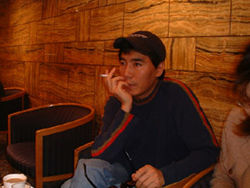|
The Foul King Kim Jee-woon Director |
 Korea is currently seeing an unprecedented boom in directors, and Kim Jee-won's first film The Quiet Family, a spectacular success that ranked in the top five Korean films of the year for box-office profit, has definitely contributed to the excitement. For his second film, Kim chose to make a "professional wrestling comic action film" about a wrestler who spends his days as a pathetic bank clerk bullied around by his boss but transforms into "The Foul King" to wreak havoc in the ring at night. This one was a pure box-office smash; the film ranked among the top Korean films ever.
Korea is currently seeing an unprecedented boom in directors, and Kim Jee-won's first film The Quiet Family, a spectacular success that ranked in the top five Korean films of the year for box-office profit, has definitely contributed to the excitement. For his second film, Kim chose to make a "professional wrestling comic action film" about a wrestler who spends his days as a pathetic bank clerk bullied around by his boss but transforms into "The Foul King" to wreak havoc in the ring at night. This one was a pure box-office smash; the film ranked among the top Korean films ever. That said, Kim claims he was "stumbling around in the dark. I had no confidence that it would be a success whatsoever. There's no 'professional wrestling genre" in Korean film, so I had no idea how this film would be received. Moreover, professional wrestling itself has lost its popularity now, and barely stays afloat by going on the road. There was a possibility the film might attract a middle-aged audience who feel nostalgic for wrestling's popularity in the 1960s and 70s, but I thought for sure that young people would give it the cold shoulder. Nonetheless, Kim chose professional wrestling as his subject because he saw it as a vehicle through which he could express what he wants to talk about now. "I was watching professional wrestling, and I thought 'This is society today. This is society miniaturized.' To me, people today are all controlled by something that has been preordained by someone outside. Society today sometimes looks like a show put on by that kind of people. These feelings were the deciding factor in making the film, and are reflected in the film by the way that the main character is an ordinary bank clerk." The bank clerk turned "Foul King" who makes audiences roar with laughter is played by Song Kang-ho, a regular in Kim's films since he appeared in The Quiet Family. The role fits him so well, it's as if the film was made for him. "To be honest, when I was writing the script, I didn't mean to cast him again. I mean, I couldn't imagine him as an "ordinary bank clerk" at all," laughed the director. "But I was writing the script with no one in particular in mind, I kept getting calls from him. Nothing important, just 'How's it going?' And by the time I finished writing, for some reason or other he'd become the perfect person for the part," he continued with another laugh. So in the end, it was clear that the film couldn't be made without him." With it's intriguing combination of extreme close-ups and long shots and its distinctive timing, The Foul King seems as if it must have been shot from a storyboard calculated out to the finest detail, but apparently Kim works the exact opposite way. Kim's reunion with Song, an actor who understands him well, worked to good effect here too. "I don't draw any storyboards, and I barely ever rehearse scenes. I want to place complete trust in the actors' natural breathing and acting right there on the spot. That's how I work. So it's imperative that the actors understand my films. The way I see it, actors understand the film 100% from the moment I give them the script. I don't give them any other direction on the set. Nagisa Oshima once said, "The actors speak the lines that I've thought up. What more can a director want?' When I heard this, I was moved, and thought it represented my thoughts exactly." For director Kim, who sees contemporary society as a show put on people manipulated by something else, the film set might just be one paradise where he is free from the pro-wrestling we know as the world today. Sozo Teruoka Film Critic
Director's Profile: Born in Seoul in 1962. Graduated from Seoul Institute of Art. Worked as a writer for theatre play. His first film was The Quiet Family. Filmography: The Quiet Family (1997; Portugal Fantasporto Film Festival / Best Film Award, Citges Film Festival, Brussels Fantastic Film Festival, Berlin International Film Festival / Young Forum). |